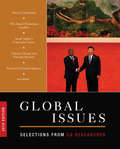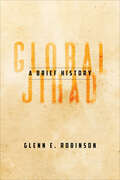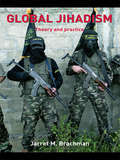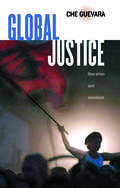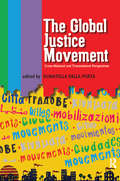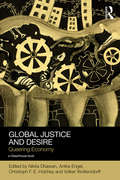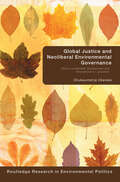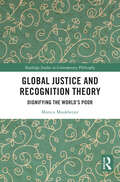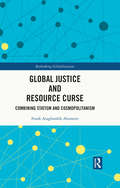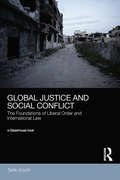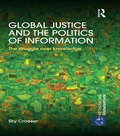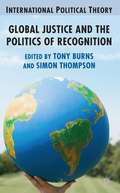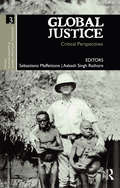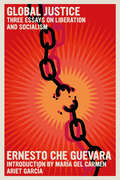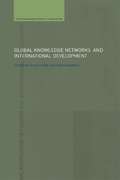- Table View
- List View
Global Issues: Selections from CQ Researcher
by Cq ResearcherWritten by award-winning CQ Researcher journalists, this collection of non-partisan reports offers an in-depth examination of today’s most pressing global issues. With reports ranging from rising sea levels, to global population pressures, to the Israeli-Palestinian conflict, the 2019 Edition of Global Issues promotes in-depth discussion, facilitates further research, and helps readers formulate their own positions on crucial global issues. And because it’s CQ Researcher, the reports are expertly researched and written, presenting readers with all sides of an issue. Key Features Chapters follow a consistent organization, beginning with a summary of the issue, then exploring a number of key questions around the issue, next offering background to put the issue into current context, and concluding with a look ahead. A pro/con debate box in every chapter offers readers the opportunity to critically analyze and discuss the issues by exploring a debate between two experts in the field. All issues include a chronology, a bibliography, photos, charts, and figures to offer readers a more complete picture of the issue at hand.
Global Jihad in Muslim and non-Muslim Contexts
by Jonathan MatusitzThis book examines ten reasons for global jihad today. Specifically, the reasons are (1) radicalization, (2) group dynamics and socialization, (3) social alienation, (4) religious motivations, (5) legal motivations, (6) political motivations, (7) a Clash of Civilizations, (8) economic conditions, (9) transformative learning, and (10) outbidding and internal rifts. To investigate these points, all chapters include the historical background, specific case studies (both past and current), statistics, and theoretical approaches to the subject of global jihad. The main purpose of jihad is to achieve global domination—through any means, including violence—and establish the Caliphate. The Caliphate is a Muslim system of world government that seeks to establish a new world order by overthrowing the current order, effectively creating an all-encompassing Islamic state.
Global Jihad: A Brief History
by Glenn E. RobinsonMost violent jihadi movements in the twentieth century focused on removing corrupt, repressive secular regimes throughout the Muslim world. But following the 1979 Soviet invasion of Afghanistan, a new form of jihadism emerged—global jihad—turning to the international arena as the primary locus of ideology and action. With this book, Glenn E. Robinson develops a compelling and provocative argument about this violent political movement's evolution. Global Jihad tells the story of four distinct jihadi waves, each with its own program for achieving a global end: whether a Jihadi International to liberate Muslim lands from foreign occupation; al-Qa'ida's call to drive the United States out of the Muslim world; ISIS using "jihadi cool" to recruit followers; or leaderless efforts of stochastic terror to "keep the dream alive." Robinson connects the rise of global jihad to other "movements of rage" such as the Nazi Brownshirts, White supremacists, Khmer Rouge, and Boko Haram. Ultimately, he shows that while global jihad has posed a low strategic threat, it has instigated an outsized reaction from the United States and other Western nations.
Global Jihadism: Theory and Practice (Political Violence)
by Jarret M. BrachmanGlobal Jihadism exposes the core doctrine and strategy of today’s global Jihadist movement. The first half of the book explores the ideas upon which groups such as Al Qaeda are built, including the concepts of Jihad, al-Wala wal-Bara, Takfir and Tawhid. Jarret Brachman exposes a genre of Jihadist strategic scholarship that has been virtually ignored in the West and helps to situate it within the broader Salafist religious movement. The second half explores the thinking and activities of Al Qaeda’s propaganda machine, explaining its intricacies and idiosyncrasies. It includes case studies on the rise and fall of global Jihadist terrorism in Saudi Arabia post-9/11, and highlights the explosive results of bringing theory to bear on practice in the United Kingdom over the past twenty years. The book concludes by providing innovative strategies for combating the global Jihadist ideology.
Global Justice
by Ernesto Che GuevaraErnesto Che Guevara presents a revolutionary view of a different world in which human solidarity replaces imperialist aggression and exploitation. Includes Socialism and Man in Cuba, plus Che's controversial speech in Algiers in 1965.
Global Justice
by Ernesto Che Guevara María del Ariet GarcíaIs there an alternative to the neoliberal globalization that is ravaging our planet? Collected here are three classic works by Che Guevara, including his essay, "Socialism and Man in Cuba.""The powerful of the earth should take heed: deep inside that T-shirt where we have tried to trap him, Che's eyes are still burning with impatience." Ariel Dorfman
Global Justice Activism and Policy Reform in Europe: Understanding When Change Happens (Routledge Advances in Sociology #90)
by Peter Utting Mario Pianta Anne EllersiekCivil society activism around issues of global justice has proliferated in Europe during the past two decades. Has such contestation and advocacy made a difference? This book examines whether and how the organizations, networks and campaigns involved have attained their policy objectives in the areas of debt relief, international trade, international taxation and corporate accountability. The analysis also considers the relationship between national and transnational activism. By comparing variations in the "activism-policy nexus" in France, Italy and the United Kingdom, it seeks to understand how such interaction and policy outcomes vary in different institutional and political contexts.
Global Justice Movement: Cross-national and Transnational Perspectives
by Raffaele Marchetti Donatella Della Porta Massimiliano Andretta Jennifer Hadden Helene Combes Manuel Jimenez Angel Calle Marco G. Giugni Nina Eggert"Della Porta has assembled a distinguished group of scholars who have made great strides in illuminating the early phases of the movement. The book includes especially keen analyses of the movement against global capitalism, particularly in its European manifestations." John D. McCarthy, Pennsylvania State University "Della Porta has skillfully coordinated a comparative study in six European countries and the US. Renowned scholars give testimony of the movement in their countries. [This is] the first attempt to document a genuine transnational movement." Bert Klandermans, Vrije Universiteit, Amsterdam You G-8, we 6 billion!" So went the chant at the international parade leading into the summit in Genoa, Italy. The global justice movement has led to a new wave of protest, building up transnational networks, inventing new strategies of action, constructing new images of democracy, and boldly asserting that "another world is possible". This book examines all this and more with case studies drawn from seven different countries, covering transnational networks and making cross-national comparisons. Leading European and American scholars analyze more than 300 organizations and 5,000 activists, looking at mobilizations that bridge old and new movements and bring politics back to the street. Contributors include: Massimiliano Andretta, Angel Calle, Helene Combes, Donatella della Porta, Nina Eggert, Marco Giugni, Jennifer Hadden, Manuel Jimenez, Raffaele Marchetti, Lorenzo Mosca, Mario Pianta, Herbert Reiter, Christopher Rootes, Dieter Rucht, Clare Saunders, Isabelle Sommier, Sidney Tarrow, Simon Teune, Mundo Yang.
Global Justice and Desire: Queering Economy (Social Justice)
by Nikita Dhawan Antke Engel Christoph H.E. Holzhey Volker WoltersdorffEmploying feminist, queer, and postcolonial perspectives, Global Justice and Desire addresses economy as a key ingredient in the dynamic interplay between modes of subjectivity, signification and governance. Bringing together a range of international contributors, the book proposes that both analyzing justice through the lens of desire, and considering desire through the lens of justice, are vital for exploring economic processes. A variety of approaches for capturing the complex and dynamic interplay of justice and desire in socioeconomic processes are taken up. But, acknowledging a complexity of forces and relations of power, domination, and violence – sometimes cohering and sometimes contradictory – it is the relationship between hierarchical gender arrangements, relations of exploitation, and their colonial histories that is stressed. Therefore, queer, feminist, and postcolonial perspectives intersect as Global Justice and Desire explores their capacity to contribute to more just, and more desirable, economies.
Global Justice and International Economic Law
by Frank J. GarciaFor centuries, international trade has been seen as essential to the wealth and power of nations. More recently we have started to understand its problematic role as an engine of distributive justice. In this compelling book Frank J. Garcia proposes a new way to evaluate, construct and manage international trade – one that is based on norms of economic justice, comparative advantage and national interest. Garcia examines three ways to conceptualize the problem of trade and global justice, drawn from Rawlsian liberalism, communitarianism and consent theory. These approaches illustrate specific issues of importance to the way global justice has been theorized, offering a pluralistic mode of arguing for global justice and highlighting the unique modes of discourse we employ when engaging with global justice and their implications for conceptualizing and arguing the problem. Garcia suggests a new direction for trade agreements built around truly consensual trade negotiations and the kind of international economic system they would structure.
Global Justice and Neoliberal Environmental Governance: Ethics, Sustainable Development and International Co-Operation (Environmental Politics)
by Chukwumerije OkerekeThis book is an ethical critique of existing approaches to sustainable development and international environmental cooperation, providing a detailed and structured account of the tensions, normative shifts and contradictions that currently characterize it. With specific focus on three environmental regimes, the volume explores the way various notions of justice feature both implicitly and explicitly in the design of global environmental policies. In so doing, the dominant conceptions of justice that underpin key global environmental policies are identified and criticised on the basis of their compatibility with the normative essence of global sustainable development. Global Justice and Neoliberal Environmental Governance demonstrates that whilst moral norms inflict far greater impact in regime development than is currently acknowledged by orthodox approaches to regime analysis, the core polices remain rooted in two neo-liberal interpretations of justice which undermine the ability to achieve sustainable development and international justice. It will appeal to students and scholars of politics, philosophy, international relations, geography and law.
Global Justice and Recognition Theory: Dignifying the World’s Poor (Routledge Studies in Contemporary Philosophy)
by Monica MookherjeeIn the light of intense international focus on ongoing forms of world poverty, this book examines the potential of the concept of recognition in contemporary political philosophy to respond morally to this dire condition. This book uses recognition theories to develop a two-tiered response to the problem of global poverty. First, it highlights non-degradation, non-humiliation and the avoidance of social suffering as essential components to the agency of the very poor. This runs counter to liberal arguments that focus only on the deficit of basic material interests. Second, even if universal conditions of agency are met, many of the world’s extreme poor may still suffer domination. The book argues that empowering the world’s poor to resist domination is an essential response to global poverty. By conceiving poverty in terms of agency and empowerment, this book highlights the transnational relevance of recognition theory to one of the most crucial problems affecting a rapidly globalizing world. Global Justice and Recognition Theory will be of interest to scholars and advanced students working in social and political philosophy, political theory, and global justice.
Global Justice and Resource Curse: Combining Statism and Cosmopolitanism (Rethinking Globalizations #1)
by Frank Aragbonfoh AbumereThis book explores whether any theory alone is sufficiently capable of resolving the complexity of global justice, arguing that a combination of statism and cosmopolitanism is needed. In current times, xenophobia, nationalism and populism have amplified othering in both domestic and international politics. In global justice, the dichotomy between the ‘polis’ and the ‘cosmopolis’ separates statism from cosmopolitanism. Using resource curse as a complex case of global justice, the author demonstrates how neither statism nor cosmopolitanism alone are sufficient but goes on to argue that a combination of the two theories is simultaneously necessary and sufficient to resolve the complexity of global justice. He demonstrates how statism is primarily applied to the institutional dimensions of resource curse and only secondarily applied to the interactional dimensions, while cosmopolitanism is applied to the interactional dimensions but only secondarily applied to the institutional dimensions, and therefore a combination of both theories is needed to resolve the problem of resource curse – using the strength of the former to compensate for the weakness of the latter, and vice versa. Global justice is widely taught and researched as one of the most important areas in political philosophy and political theory. This book will be of great interest to students and researchers, philosophers and political scientists of African politics, political theory, political philosophy, international relations and international development.
Global Justice and Social Conflict: The Foundations of Liberal Order and International Law
by Tarik KochiGlobal Justice and Social Conflict offers a ground-breaking historical and theoretical reappraisal of the ideas that underpin and sustain the global liberal order, international law and neoliberal rationality. Across the 20th and 21st centuries, liberalism, and increasingly neoliberalism, have dominated the construction and shape of the global political order, the global economy and international law. For some, this development has been directed by a vision of ‘global justice’. Yet, for many, the world has been marked by a history and continued experience of injustice, inequality, indignity, insecurity, poverty and war – a reality in which attempts to realise an idea of justice cannot be detached from acts of violence and widespread social conflict. In this book Tarik Kochi argues that to think seriously about global justice we need to understand how both liberalism and neoliberalism have pushed aside rival ideas of social and economic justice in the name of private property, individualistic rights, state security and capitalist ‘free’ markets. Ranging from ancient concepts of natural law and republican constitutionalism, to early modern ideas of natural rights and political economy, and to contemporary discourses of human rights, humanitarian war and global constitutionalism, Kochi shows how the key foundational elements of a now globalised political, economic and juridical tradition are constituted and continually beset by struggles over what counts as justice and over how to realise it. Engaging with a wide range of thinkers and reaching provocatively across a breadth of subject areas, Kochi investigates the roots of many globalised struggles over justice, human rights, democracy and equality, and offers an alternative constitutional understanding of the future of emancipatory politics and international law. Global Justice and Social Conflict will be essential reading for scholars and students with an interest in international law, international relations, international political economy, intellectual history, and critical and political theory.
Global Justice and the Politics of Information: The struggle over knowledge (Rethinking Globalizations)
by Sky CroeserThe global social justice movement attempts to build a more equitable, democratic, and environmentally sustainable world. However, this book argues that actors involved need to recognise knowledge - including scientific and technological systems - to a greater extent than they presently do. The rise of the Occupy movement, the Arab Spring and the Wikileaks controversy has demonstrated that the internet can play an important role in helping people to organise against unjust systems. While governments may be able to control individual activists, they can no longer control the flow of information. However, the existence of new information and communications technologies does not in itself guarantee that peoples' movements will win out against authoritarian governments or the power of economic elites. Drawing on extensive interviews and fieldwork, this book illustrates the importance of contributions from local movements around the world to the struggle for global justice. Including detailed case studies on opposition to genetically-modified crops in the south of India, and the digital liberties movement, this book is vital reading for anyone trying to understand the changing relationship between science, technology, and progressive movements around the world. This book will be of interest to students and scholars of International Politics, Social movements, Global Justice and Internet politics.
Global Justice and the Politics of Recognition
by Simon Thompson Tony BurnsTwo issues have been central within political philosophy in the last decade or so. The first is the debate over 'the politics of distribution versus the politics of recognition, ' which is usually associated with the work of Axel Honneth and Nancy Fraser. The second is discussion of the phenomenon known as globalization, focusing on the notions of cosmopolitanism and global justice. This book explores the relationship between these two issues. It considers not only the global dimension of the politics of recognition, but also how recognition theory can provide new insights into our understanding of problems of global justice, especially those of a non-distributive nature. A number of the contributors consider the relevance of Hegel's theory of recognition for our understanding of these issues.
Global Justice in East Asia (Political Theories in East Asian Context)
by Jun-Hyeok Kwak Hugo El KholiAs a fascinating study of global justice in Asia, this book presents a series of contributions reflecting upon the conditions of a greater involvement of East Asian traditions of thought in the debate on global justice. Including chapters on diverse issues such as global social inequalities, human rights practice and the functioning of international institutions, this book examines the political cultures of East Asia in order to help political theorists better appraise the distinctiveness of non‐Western ideas of justice. Confirming the persistence of a strong social ethos, the contributions also demonstrate the long-lasting influence of Buddhism, Taoism and Confucianism in shaping East Asian public conceptions of justice. Bringing much needed non-Western voices to the global justice debate, this book will appeal to students and scholars of politics, law and philosophy, as well as activists involved in the global justice movement.
Global Justice, Christology, and Christian Ethics
by Lisa Sowle CahillGlobal realities of human inequality, poverty, violence and ecological destruction call for a twenty-first-century Christian response which links cross-cultural and interreligious cooperation for change to the Gospel. This book demonstrates why just action is necessarily a criterion of authentic Christian theology, and gives grounds for Christian hope that change in violent structures is really possible. Lisa Sowle Cahill argues that theology and biblical interpretation are already embedded in and indebted to ethical-political practices and choices. Within this ecumenical study, she explores the use of the historical Jesus in constructive theology; the merits of Word and Spirit Christologies; the importance of liberation and feminist theologies as well as theologies from the global south; and also the possibility of qualified moral universalism. The book will be of great interest to all students of theology, religious ethics and politics, and biblical studies.
Global Justice, Human Rights and the Modernization of International Law
by Riccardo Pisillo Mazzeschi Pasquale De SenaThis book is based on the observation that international law is undergoing a process of change and modernization, driven by many factors, among which the affirmation and consolidation of the role of the individual and of the theory of human rights stand out. In the contemporary world, international law has demonstrated an ability to evolve rapidly. But it is still unclear whether its modernization process is also producing structural changes, which affect the subjects, the sources and even the very purpose of this law. Is it truly possible to speak of a paradigmatic and ideological change in the international legal system, one that also involves a transition from a state-centred international order to a human-centred one, and from inter-state justice to global justice?The book addresses three fundamental aspects of the modernization process of international law: the possible widening of the concept of international community and of the classic assumptions of statehood; the possible diversification of the sources of general international law; and the ability of international law to adapt to new challenges and to achieve the main goals for humanity set by the United Nations.The overall objective of the book is to provide the tools for a deeper understanding of the transition phase of contemporary international law, by examining the major problems that characterize this phase. The book will also stimulate critical reflection on the future prospects of international law.
Global Justice, Kant and the Responsibility to Protect: A Provisional Duty (Global Politics and the Responsibility to Protect)
by Heather M. RoffThis book provides an innovative contribution to the study of the Responsibility to Protect and Kantian political theory. The Responsibility to Protect (R2P) doctrine has been heralded as the new international security norm to ensure the protection of peoples against genocide, ethnic cleansing, war crimes and crimes against humanity. Yet, for all of the discussion, endorsements and reaffirmations of this new norm, R2P continues to come under fire for its failures, particularly, and most recently, in the case of Syria. This book argues that a duty to protect is best considered a Kantian provisional duty of justice. The international system ought to be considered a state of nature, where legal institutions are either weak or absent, and so duties of justice in such a condition cannot be considered peremptory. This book suggests that by understanding the duty’s provisional status, we understand the necessity of creating the requisite executive, legislative and judicial authorities. Furthermore, the book provides three innovative contributions to the literature, study and practice of R2P and Kantian political theory: it provides detailed theoretical analysis of R2P; it addresses the research gap that exists with Kant’s account of justice in states of nature; and it presents a more comprehensive understanding of the metaphysics of justice as well as R2P. This book will be of much interest to students of the Responsibility to Protect, humanitarian intervention, global ethics, international law, security studies and international relations (IR) in general.
Global Justice, State Duties
by Malcolm Langford Wouter Vandenhole Martin Scheinin Willem van Genugten Malcolm Langford Wouter Vandenhole Martin Scheinin Willem Van GenugtenThe rise of globalization and the persistence of global poverty are straining the territorial paradigm of human rights. This book asks if states possess extraterritorial obligations under existing international human rights law to respect and ensure economic, social, and cultural rights and how far those duties extend. Taking a departure point in theory and practice, the book is the first of its kind to analyze the principal cross-cutting legal issues at stake: the legal status of obligations, jurisdiction, causation, division of responsibility, and remedies and accountability. The book focuses specifically on the role of states but also addresses their duties to regulate powerful nonstate actors. The authors demonstrate that many key issues have been resolved or clarified in international law while others remain controversial or await the development of further practice, particularly the scope of jurisdiction and the quantitative dimension of extraterritorial obligations to fulfill.
Global Justice: Critical Perspectives (Ethics, Human Rights and Global Political Thought)
by Sebastiano Maffettone; Aakash Singh RathoreThe global justice debate has been raging for forty years. Not merely the terms and conditions, but, more deeply, the epistemic, existential and ethical grounds of the international relations of persons, states and institutions are being determined, debated and negotiated. Yet the debate remains essentially a parochial one, confined largely to Western intellectuals and institutional spaces. An Introduction to the field is therefore still urgently required, because it remains necessary to include more ‘global’ voices into this debate of worldwide reach and significance. The book addresses this need in two closely related ways. In Part I, it introduces the main contours of the debate by reproducing three of the most fundamental and influential essays that have been composed on the topic — essays by Peter Singer, Thomas Pogge and Thomas Nagel. In Part II, it makes a decisive critical intervention in the main stream of the debate through exposing the participation deficit afflicting the theorization of global justice. This part begins with a well-known essay by Amartya Sen, who famously referred to the ‘parochialism’ of the global justice debate in making a break with the Rawlsian paradigm that has dominated the field until now. Finally, a series of lively essays newly composed for this volume reflect on the possibilities for deparochializing global justice opened up by Sen’s work in this area. The book will be useful for students of international relations, postcolonial studies, political theory, and social and political philosophy, as well as for those engaged in studies of globalization or global studies.
Global Justice: Seminal Essays
by Thomas Pogge Darrel MoellendorfCarefully selected papers by political philosophers and political theorists on global justice.
Global Justice: Three Essays on Liberation and Socialism (The Che Guevara Library)
by Ernesto Che GuevaraThree speeches on corporate globalism and imperialism by one of the most widely known guerilla fighters, political theorists, and organizers, Che Guevara.In this collection of three speeches, Ernesto Che Guevara offers a revolutionary view of a world in which human solidarity and understanding replace imperialist aggression and exploitation. First, in a sharp speech given in Algeria on February 24, 1965 at the Afro-Asia Economic Seminar, Che speaks about the nature of capitalism and the revolutionary struggle that would open the way for a new, socialist society. Guevara's 1965 essay, "Socialism and Man in Cuba," is a milestone in twentieth-century emancipatory social thought. Finally, &“Message to the Tricontinental&” is one of Che&’s more well-known works, which outlines the tactics and strategies that should be followed in revolutionary struggle. This collection of writings merges Che's philosophy, politics, and economics in his all encompassing, coherent revolutionary vision. His ideas and his struggle strike a chord in the current search for global justice.
Global Knowledge Networks and International Development (Routledge Studies in Globalisation)
by Diane Stone Simon MaxwellThis volume draws together leading experts from academia, think-tanks and donor agencies, to examine the impact of transnational knowledge networks in the formulation of local, national and global policy in the field of international development and transition studies. These leading contributors pay particular attention to the global reach of research and the manner in which knowledge is incorporated into, and shapes, transnational policy domains. They show how the 'knowledge agenda' has become a central part of the discourse of both developing societies and advanced economies. Governments and international organizations devote considerable financial resources to both in-house and contracted research.This volume will be of great interest to students, researchers and policy makers concerned with global policy, global governance and development.
